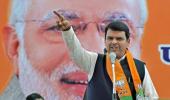 Once he towered over the Congress' Mumbai unit, its crucial link with New Delhi, but towards the end he became a nowhere man, says N Suresh.
Once he towered over the Congress' Mumbai unit, its crucial link with New Delhi, but towards the end he became a nowhere man, says N Suresh.
Gurudas Kamat, who on Wednesday, August 22, after suffering a heart attack, was a leader who had class, style and a pleasing demeanour.
Despite these winning qualities, Kamat got lost in the internecine politics of Mumbai.
As a Congress leader, Kamat exhibited a different style, preferring conversation over a quick exchange of notes. He would be accessible to reporters even though he had his fixed coterie of journalists to whom he would give out exclusives, share a document with, by calling them at the end of the day.
Kamat, who had a stronghold over Mumbai Congress politics, had his hardcore band of loyalists, people who stood by him through all. He was not to let go of this control for long, which also caused him a lot of distress in his later years.
A true Congressman, Guru, as he was popularly called, had a lot of access to the party high command and its trust, which few leaders in Maharashtra enjoyed.
Over a period of time, Guru progressed from Mumbai to national politics, as an All India Congress Committee member, and even a minister of state with independent charge of the newly-created ministry of drinking water and sanitation, a post he sulked over.
Even though he was a member of Parliament, Guru did not wish to lose his hold over his city, and his loyalists would continue to head Mumbai Congress.
Such was his obsession that when Kripa Shankar Singh, who was also close to the Gandhi family, took over the city unit, Kamat sent his loyalists with bound volumes of evidence against him.
Their rivalry was well known and one that cost Guru some of his clout within and outside the party. Over a period of time he became disgruntled, despite enjoying the Congress president's trust.
The leader who once would respond to phone calls and text messages himself began communicating through his personal secretary and public relations officer, slowly distancing himself from everyone, before he would suddenly storm one's inbox with e-mails about his achievements.
The word in state Congress circles was that Guru was losing his rapport with party workers and the media in Mumbai, which he once enjoyed. His annual dinners and Diwali gifts to win friends and influence people were a topic of discussion for years in Maharashtra.
That was the time when he would be on top of all information and statistics regarding elections, seats and issues pertaining to the state. He was seen as the link between the Congress party in Mumbai and the central HQ in Delhi, which worked to his benefit.
Over the last couple of years, Guru seemed lost and in a conflict of sorts within his party. The leader who once commanded trust seemed to have developed a distrust of even those who had set aside their political ambitions, content to live in his shadow.
Guru resigned from and rejoined the Congress in recent years, which led to the central leadership losing trust in him, the same leadership that he was once close to. News of his comings and goings would make it to the gossip sections of newspapers, a reflection of his own reduced status in politics.
Nevertheless, in his death, the Congress has lost a leader with fine qualities and a true Mumbai loyalist.











 © 2025
© 2025